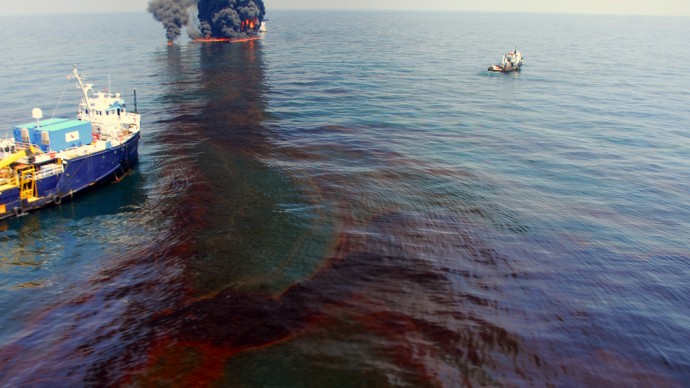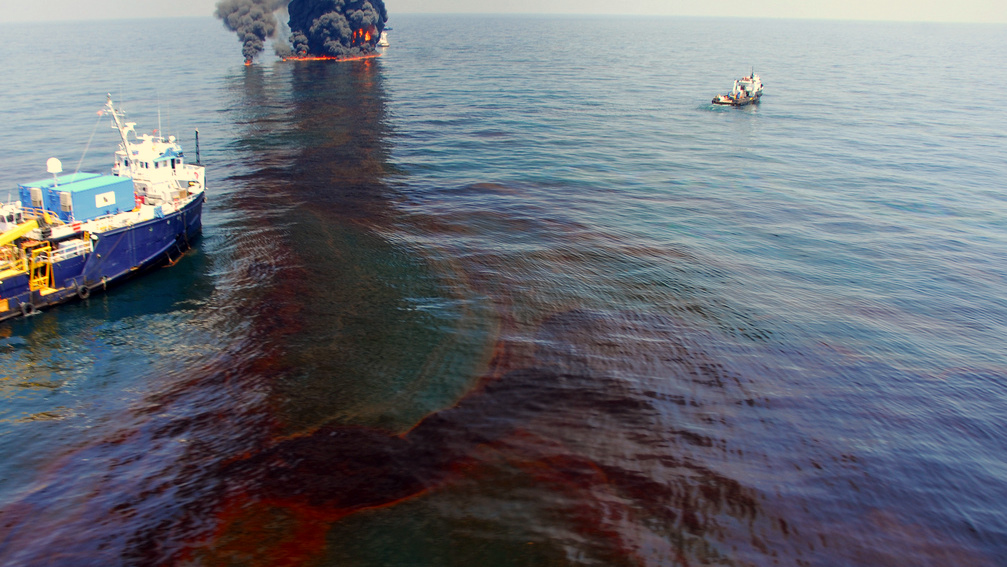
(MintPress)—British Petroleum (BP) recently announced it has reached an estimated $7.8 billion settlement with the Plaintiffs’ Steering Committee (PSC) in order to resolve economic loss, property damage and medical claims from the 2010 Deepwater Horizon accident and oil spill in the Gulf of Mexico, pending final approval by U.S. District Judge Carl Barbier. While negotiators on either side see the settlement as a reasonable deal, some experts and claimants have the opinion that BP will end up coming ahead financially and wonder if the $20 billion trust fund set up by BP to repay claimants will be enough.
The proposed settlement does not include claims made by the United States Department of Justice or other federal agencies; state and local governments; pending securities and shareholders; and those based solely on the deepwater drilling moratorium and/or the related permitting process, which are expected to add billions more to BP’s overall costs.
Settlement details
The BP settlement reached two agreements, including one relating to private economic losses in relation to the oil spill and the second to compensate individuals with medical claims related to the spill. Claimants are eligible to participate in either or both of the settlement programs.
For eligible claimants, the settlement is expected to make up for any financial losses businesses and individuals sustained due to the oil spill. People living or working in close proximity to the Gulf Coast as well as those in the seafood industry will not need proof of the losses suffered from the spill. However, for individuals and businesses that are not located near the Gulf Coast but still filed a claim, proof documenting the financial losses of the spill must be filed.
According the an official BP statement, of the estimated $7.8 billion to be paid, $2.3 billion would be used to resolve economic loss claims related specifically to the seafood industry in the Gulf. This number may seem low considering the Gulf Coast is the largest producer of shrimp and oysters in the country, producing 85 and 60 percent, respectively. It is estimated that the seafood industry in Louisiana alone lost half its production following the spill.
In a report released by BBVA Research, oil from the spill sinking to the bottom of the Gulf could produce losses in the seafood processing and wholesale industries of up to $6 billion over the next 13 years. Additionally, recreational fishing is estimated to lose $4.7 billion in revenue over the same period.
Lower-income victims of economic loss caused by the spill have complained that higher-income individuals and businesses have received more attention and better service on their claims, leaving claimants wondering if their payments will be received before money from the trust fund runs out.
Claimants who depend on the tourism industry for their paychecks, including maids, bartenders, hotel clerks and souvenir vendors as well as Vietnamese-American fisherman, may have been hit hardest by the the spill. While BP paid larger companies for their loses, many smaller claims have been pushed aside.
Although he has received some payments from BP for lost wages, Ri Nguyen, a shrimper in Biloxi, Miss., said that the money is not even close to the amount he would have earned catching shrimp.
“I’m worried about the future. Can we go back to the work that we know?”
Other claimants have voiced similar concerns. David Fouche, a chef at Deanie’s Seafood Restaurant in New Orleans, said that even though his restaurant was already paid a settlement from BP for damages, the money was not enough to cover all of the restaurant’s expenses.
Medical concerns
With the addition of health care costs added to the settlement, payment questions become more pronounced. Currently, the effect of the oil spill on long-term medical conditions is unknown.
However, in a commentary published in the Journal of the American Medical Association on the possible future health affects of the oil spill, two scientists state that the spill “poses direct threats to human health from inhalation or dermal contact with the oil and dispersant chemicals, and indirect threats to seafood safety and mental health.”
According to the report, volatile organic compounds coming from the oil can cause exposed individuals respiratory irritation and depression as well as the possibility of cancer. The mental well-being of citizens living near the Gulf may be at risk as well due to personal and financial stress.
Without significant and concrete evidence of long-term, spill-related illnesses coupled with the cost of each round of chemotherapy for leukemia averaging $150,000 and bone marrow transplants averaging $250,000, it is hard for experts to estimate how much money will be paid out for medical-related expenses.
Therefore, the settlement includes a periodic medical consultation program to those affected by the spill for 21 years. In addition, a grant of $100 million is set aside to establish a 5-year program to improve access to health care services in the Gulf Coast region. This program will be open to the public, regardless of claimant status.
However, while individual and business payments for economic losses will begin before final approval, medical claims will not be paid out until final approval is given on the overall settlement.
Why settle?
In April 2010, an explosion on the Deepwater Horizon rig killed 11 workers and started the largest accidental oil spill in American history. Over a 3-month period, more than 4.9 million barrels of oil spilled into the Gulf of Mexico, costing BP more than $3 billion.
After urges from President Obama, BP agreed to pay $20 billion into an escrow account in order to cover any claims brought about by the oil spill in the Gulf. Apart from that, the company has spent more than $22 billion in the coast, including $8.1 billion paid to individuals, businesses and government entities and $14 billion on operational response.
Even though the settlement cost has been estimated, a statement released from the PSC states that there is no cap on the amount BP will pay, stating, “BP is obligated to fully satisfy all eligible claims under the terms of the Court supervised settlement, irrespective of the funds previously set aside.”
James Roy and Stephen Herman, lawyers for the thousands of people affected by the oil spill, said that the settlement “does the greatest amount of good for the greatest number of people.”
While the settlement seems like it will benefit those with claims against BP, many agree that BP is also profiting from the deal.
Mitch Crusto, a Loyola business and environmental law professor, said the settlement was favorable to BP. “It helps give the impression that BP is a responsible company.”
Jason Gammel, an analyst at Macquarie Capital Ltd. in London, commented that the settlement came at a lower price than expected.
“The whisper was that the deal would be closer to $14 billion, so if it turns out to be around $8 billion, that’s clearly positive for BP.”
The BBVA report states that total short-term costs of the spill could fluctuate from $7.5 billion to nearly $30 billion. The amount depends largely on the oil spill’s impact on tourism in southern states.
The future of the trust
While coastal residents have settled with BP, the federal suits against the company may prove to be more expensive. Previously, BP stated that it set aside a total of $37.2 billion to pay for all damages related to the spill. However, after this settlement, the company will have spent more than 80 percent of the allotted amount, bringing concerns over how federal, state and local government will be paid when those lawsuits are brought to court.
If BP is found to have been grossly negligent in handling the oil spill, the company could be fined as much as $4,300 per barrel. Under normal circumstances, the fine is $1,100 per barrel. With an estimated 4.9 million barrels of oil spilled into the Gulf, BP could be fined up to $21 billion, much higher than the company has allotted.
With a large range of possible total loss values, BP stated, “It is not possible to determine whether the $20 billion Trust will be sufficient to satisfy all of the claims as well as those under the proposed settlement. Should the Trust not be sufficient, payments under the proposed settlement would be made by BP directly.”
To negotiators, the settlement seems like a fair deal on both sides, but claimants are left wondering if BP has set aside adequate funding to pay for the damages.
Since details concerning the settlement were released, BP’s shares went up 1.5 percent.


